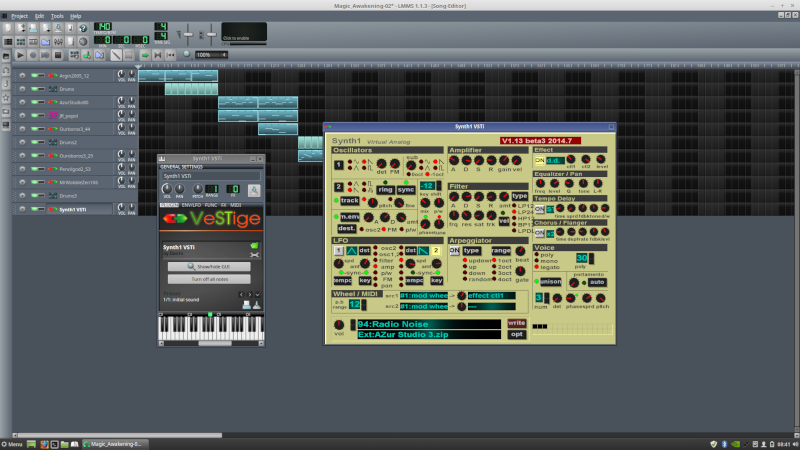- The Twonker is a free VST MIDI Plugin that allows a digital piano (or any MIDI instrument) to play tones from the Overtone Series. It is designed to run within most Digital Audio Workstations as a Synth Plugin on MacOS, Windows, and Linux.
- LMMS v.0.4.10 -Audio Tool: Price: Free: LMMS is a free cross-platform alternative to commercial programs like FL Studio®, which allow you to produce music with your computer. This includes the creation of melodies and beats, the synthesis and mixing of sounds, and arranging of samples.
- Size 17.2 MB LMMS is a free cross-platform alternative to commercial programs like FL Studio®, which allow you to produce music with your computer. This includes the creation of melodies and beats, the synthesis and mixing of sounds, and arranging of samples.
- Lmms Linux Vst Plugins Tutorial
- Lmms Linux Vst Plugins Download
- Lmms Linux Vst Plugins Plugin
- Lmms Linux Vst Plugins Vst
Preloaded with basic VST instrument plugins and modifiers LMMS comes with a triple oscillator, Gameboy sound emu, NES sound emu added into the software, which makes it easier to create sounds without the inclusion of external plugins.
Recently I’ve had lengthy discussions with a friend about how good 80s era synths like the Roland D-50 and the Yamaha DX7 sounded. Neither of us had the budget, space and, more importantly in my case, the talent for one of these beasts so I started to have a look for some emulators. There’s very little for the D-50 but the original ROMs for the DX7 are readily available online and the Dexed soft synth gets some good reviews. One of my usual YouTube haunts – Woody’s Piano Shack – has a comparison of dexed against a real DX-7:
Lmms Linux Vst Plugins Tutorial
Space vst free. I wanted to use Dexed as part of my LMMS setup and the usual way of doing this is by using a VST plugin. The Dexed GitHub releases page has a number of pre-built plugins so I had a quick check in the LMMS manual as to what to do next …
VST plugins on LMMS – part 1

Fortunately there’s a useful page on the LMMS wiki about plugins. The not so good news is that “… Because most VSTs are written to be Windows compatible, VSTs tend to work better on Windows LMMS installations. Linux LMMS installations require Wine installed before these plugins can be used.”
Hmm, OK, I’ve not really played much with Wine and I’ve heard mixed reviews about it but I’m willing to give it a go. The other key bit of information is that you need 32 bit VSTs and not the 64 bit versions.
Lmms Linux Vst Plugins Download
Wine Install
In the past I’ve found that installing Wine was a bit hit or miss and, to be honest, I never got it to do anything useful other than run Notepad or Minesweeper. However this was a few years ago and the Wine website now has a dedicated page for some distributions. The one for Ubuntu looked straightforward enough with just a few commands to be run.
To my slight surprise it worked absolutely perfectly with no problems and I soon had Wine installed. Back to the VST …
Lmms Linux Vst Plugins Plugin
VST plugins on LMMS – part 2

The wiki page very sensibly recommends that you start with a known working VST so I downloaded the recommended instrument and followed the instructions. Again I had no problems and the Wine initialisation automatically download the Gecko libraries so as to display the VST and I soon had the synth up and running. Note that the GUI that I saw was different from that on the wiki page ( left ) but it works fine.
There is another LMMS wiki page listing Tested VSTs but I found that not all of the supposedly tested ones worked on my Wine installation.
Lmms Linux Vst Plugins Vst
The Dexed installer for Windows is a .exe file and I ran that using a simple Wine command:
The normal Windows installer dialogs were shown and both a standalone and 64/32 bit VST plugins were installed. By default the Wine home directory is under “.wine” in your home directory and I copied the 32 bit VST dll ( called Dexed.dll ) from there into the area where I normally store the VSTs and started LMMS.
The Dexed plugin loaded fine and I soon had a virtual DX7 running. However there’s one more step to get the full retro sound and that is to load the original factory presets. For some reason these are not loaded as default but the Dexed home page “Cartridge Manager” section has a link to a recommended compilation of cartridges. The comments in the YouTube video above point to the DXCARTFO directory and this contains a file called CART1A.SYX which seems to provide the right sounds. I had to add the DXCARTFO to the Applications Data directory under Wine for it to be picked up properly, this is something like:
After that it’s 80s synth pop all the way 🙂
DX7 Sounds
Woody also has two other great videos exploring the different DX7 sounds which are well worth listening to: